Award winning dermatology service, with over 20 years on experience
Short waiting lists, on some occasions offering same week appointments
Safe environment, in Care Quality Commission approved facilities
SQUAMOUS CELL CARCINOMA Treatments Include:
squamous cell carcinoma treatment
Squamous cell carcinoma (SCC) is an often overlooked form of non-melanoma skin cancer. Despite accounting for only 20% of all cases, it is still a serious condition with over 147,000 new cases diagnosed in the UK on an annual basis. Early diagnosis and successful treatment are the key to managing SCC and decreasing the risk of the spreading to other parts of the body. Those who believe they may have a SCC should not hesitate in booking an appointment with their Healthcare Professional to discuss further investigation; these may include biopsy or CT/MRI scans. If necessary, they will be able to put you in contact with relevant specialists who can help to diagnose and treat your skin cancer. Ignoring early warning signs or delays in diagnosis can result in reduced chances of successful treatment or even metastasis – so remember if you’re unsure, get checked out!
Alternative names: SCC, non-melanoma skin cancer
WHAT CAUSES SQUAMOUS CELL CARCINOMA?
The most important cause is too much exposure to ultraviolet light from the sun or other sources such as tanning beds or heat lamps.
Too much sun exposure can result in changes or mutations to the DNA of skin cells (keratinocytes), as a result, this can cause the outer layer of the skin (the epidermis) to change. Over time, these changes in the DNA allows the skin cells to grow out of control and develop into Squamous Cell Carcinoma.
This sun damage can cause SCC directly, or sometimes it can induce a scaly area called an actinic keratosis or Bowen’s disease, consequently, these can develop into SCC if they are not treated.
Other common risk factors include:
- Fair or pale skin
- Light-coloured hair and blue, green, or grey eyes
- Long-term exposure to UV radiation
- Living in sunny regions or at a high altitude
- History of multiple severe sunburns, especially if they occurred early in life
- Exposure to certain chemicals, such as arsenic
WHAT ARE THE SYMPTOMS OF SQUAMOUS CELL CARCINOMA?
Squamous Cell Carcinomas often present themselves as persistent, rough, thick, tender scaly patches or a non-healing, tender and bleeding ulcer. They have a similar appearance to warts and sometimes have open sores with a raised border and crusted surface over an elevated pebbly base.
The skin around it will typically show some signs of sun damage, which can include:
- Wrinkling
- Pigment changes (darkening of the skin)
- Loss of elasticity
In addition, you will need to see a doctor or dermatologist if there are any changes in a pre-existing skin growth. These changes can include an open sore that won’t heal or any new growths that appear.
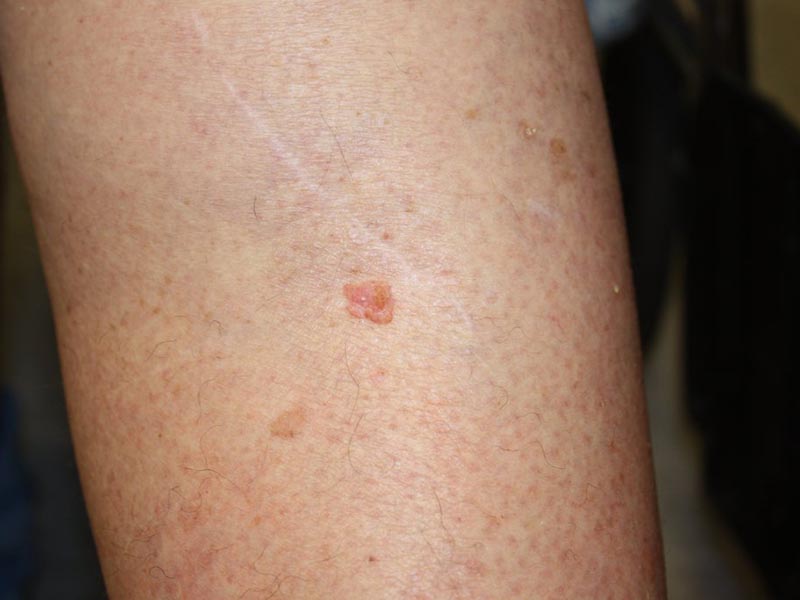
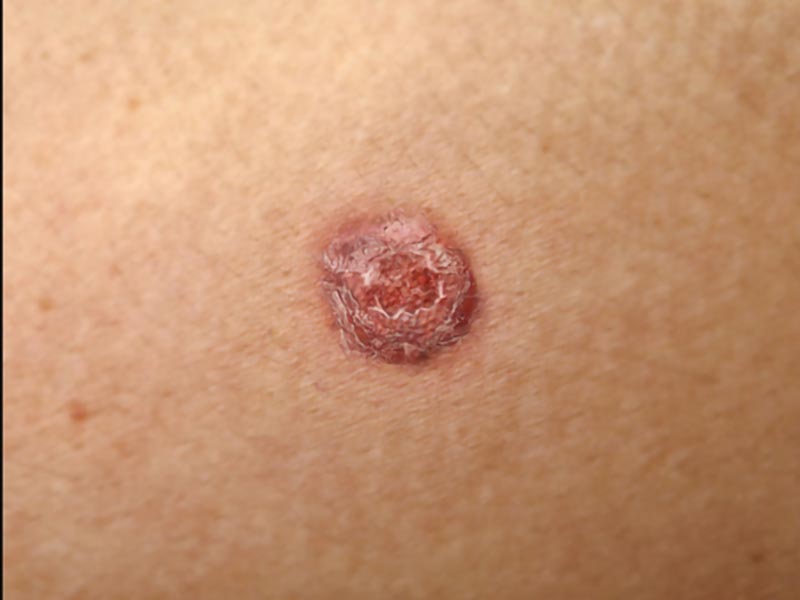
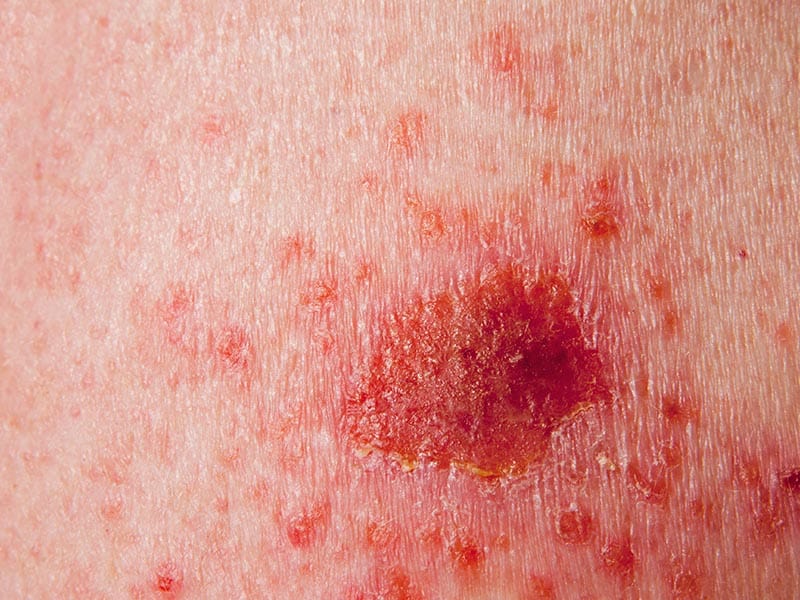
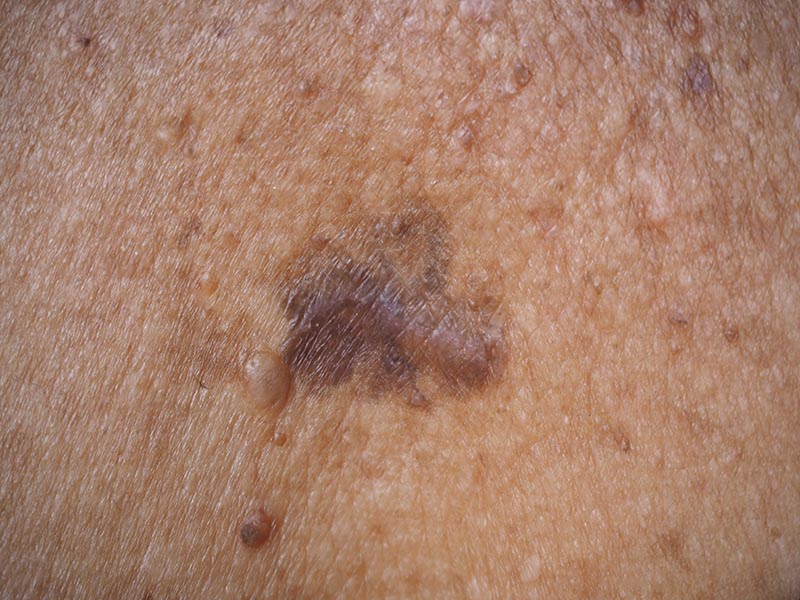
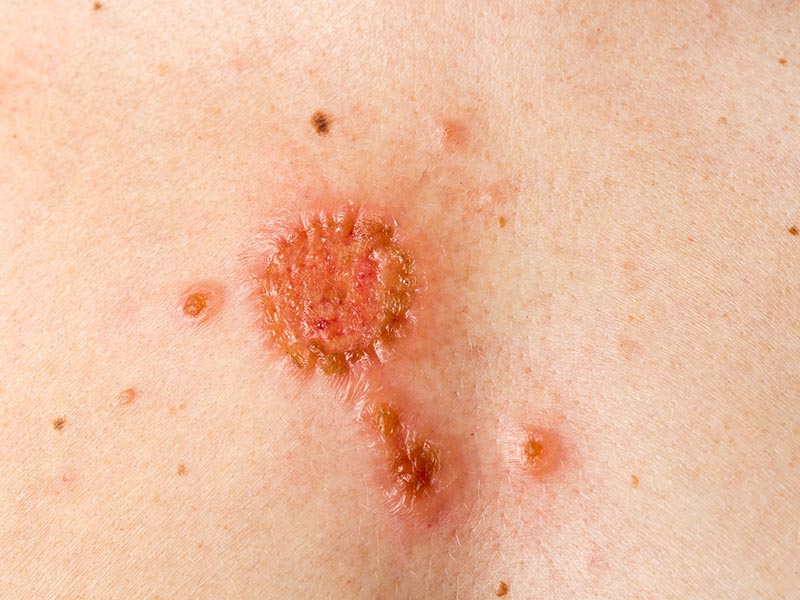
HOW CAN SQUAMOUS CELL CARCINOMA BE PREVENTED?
You can lower your chances of developing squamous cell carcinoma by reducing your exposure to UV light, both in the form of sunlight and sunbeds. When out in the sun, it is important to protect the skin from sunburn by using a high factor sun cream, avoiding the sun during the hottest part of the day and covering the skin when exposed to sunlight. The earlier squamous cell carcinoma is diagnosed and treated, the less likely you are to be left with scarring so checking your skin regularly for signs of skin cancer is really important. If you notice anything on your skin you are worried about, see a consultant dermatologist who will assess your lesion and can carry out treatment if required.
HOW TO SQUAMOUS CELL CARCINOMA?
If you have found a mole that you’re concerned about, or if the appearance of the mole has changed, it’s important to see your doctor. Your GP or dermatologist will examine your skin and any moles for any signs of skin cancer.
Our expert Dermatologists use dermatoscopes – handheld illuminated magnifiers. This highlights any specific signs of melanoma which may not be apparent to the untrained eyes. At Everything Skin Clinic, we are able to diagnose and treat skin cancer all under one roof. This is especially important for people who don’t want referrals to different places or want it removing as soon as possible. We offer fast-track appointments to ensure immediate diagnosis and treatment of skin cancers.
HOW CAN SQUAMOUS CELL CARCINOMA BE TREATED?
As with any cancer, you will need early treatment in order to prevent it from spreading. If they’re left to grow, they can become disfiguring and sometimes deadly. All Surgical treatments result in scarring, but the advantage of having surgical treatment in the hands of a fellowship trained dermatological surgeon is that they will give you the best cosmetic outcome.
Other risks with surgery include bleeding, infection, numbness of treated area and recurrence of the tumour.
There are various treatments available to remove the skin cancer. The aim of treatment is to get rid of the cancer completely. The treatment options available are:
EXCISION OF CANCER
Cutting away the cancer or ‘excision’ is the most commonly employed method for SCC. Here, the dermatologist will remove the cancer cells, as well as a thin layer of healthy skin in the surrounding area. Stitches are then used to close the wound. The tissue removed is then sent to a laboratory to see if any cancer cells remain and to get an accurate classification of the SCC. This will determine if you require further treatment.
MOHS SURGERY
Mohs micrographic surgery is the most effective treatment method for treating high-risk squamous cell carcinomas and basal cell carcinomas. It’s performed in stages, where your doctor removes a layer of skin from the treatment area and sends it straight to the lab while the patient waits. Your doctor or dermatologist will repeat this until all there are no cancer cells remaining. This technique allows the removal of all cancerous cells for the highest cure rate. While sparing healthy tissue and leaving the smallest possible scar. Another advantage is that this treatment is all done within one day and will not take multiple appointments.
FREQUENTLY ASKED QUESTIONS
HOW MIGHT SQUAMOUS CELL CARCINOMA AFFECT ME?
The rate of growth and chance of spread of squamous cell carcinoma depends on the differentiation:
- Well differentiated SCC tend to grow slowly with a very low chance of spreading
- Moderately differentiated SCC have a slightly higher rate of growth and chance of spreading than well differentiated tumours
- Poorly differentiated SCC often grow rapidly and are highly likely to spread if left untreated
IS SKIN CANCER HEREDITARY?
Skin cancer is not hereditary in the sense that it is passed down through a gene. However, skin type does run in families so those more likely to develop skin cancer are often in the same family.
WHO IS MOST AT RISK OF GETTING SKIN CANCER?
Men are more likely than women to develop skin cancer and it is more common in the elderly.
WHAT FACTOR SUNSCREEN SHOULD I USE?
It is recommended to use a high factor of sunscreen no matter your skin type. SPF30 with a 4-star UVA rating during the summer is recommended for those with paler skin to stop burning but also to help prevent wrinkles and sunspots in those who don’t burn as easily.
DO SUNBEDS CAUSE SKIN CANCER?
Research shows sun beds are a significant risk factor in skin cancer.
HOW CAN I PREVENT SKIN CANCER?
Protecting your skin is, of course, always the best course of action. The easiest ways you can do this include:
· Wearing a waterproof, high level of SPF protection when in the sun
· Use a daily moisturiser with SPF protection
· Avoid the sun when it is at its strongest during the day
· Wear a hat when in the sun
· Sit in the shade
REQUEST A CALL BACK
Please fill in this form and one of our team will give you a call back to arrange a consultation with one of our expert dermatologists.
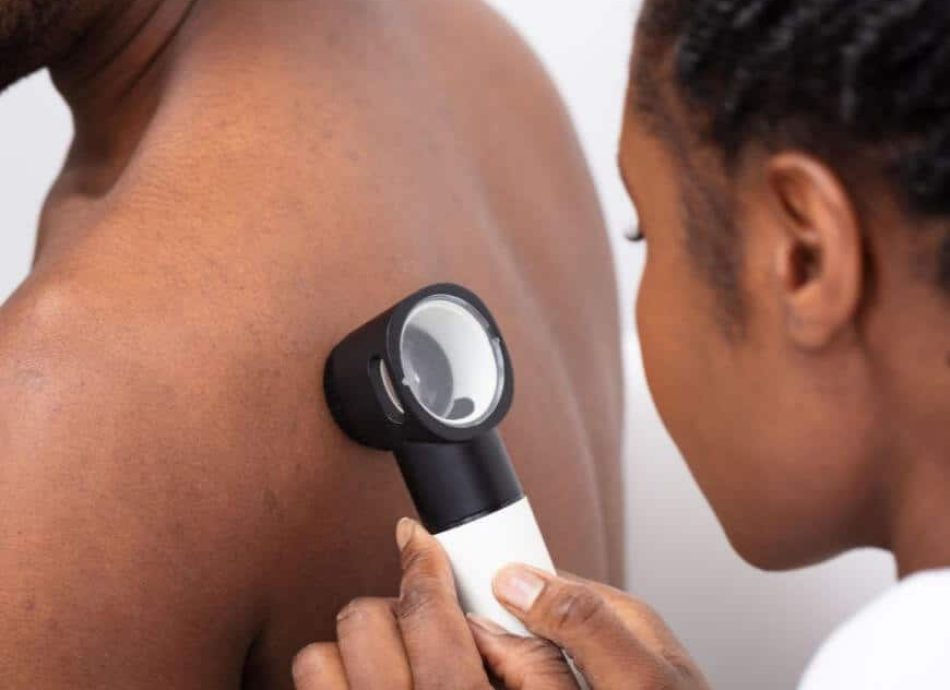
HEAR FROM OUR PATIENTS
WHY CHOOSE squamous cell carcinoma treatment FROM EVERYTHING SKIN CLINIC?
At Everything Skin Clinic™, we have a team of highly trained Consultant dermatologists, who have completed specialist training in Dermatology and are on the specialist register of the General Medical Council. All our consultants hold substantive contracts with the best Dermatology centres in leading NHS hospitals. Therefore, you can be certain of the highest quality private care.
We offer a range of treatments and can offer one, or a combination of treatments to achieve the best results. Unlike many other clinics, we can offer diagnosis and treatment all under one roof by expert consultant dermatologist, so you know you’ll be in safe hands.
INSIGHTS AND ADVICE

Comprehensive Autumn Skin Care Guide
Autumn, with all its glorious colours, also brings a few challenges for our skin. As the air gets cooler and the leaves change colour, keeping your skin glowing and healthy during the transition from summer can feel a bit tricky. But don’t fret – this
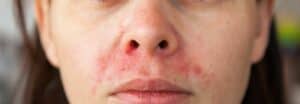
Eczema Awareness Month – Your Eczema Guide
October serves as Eczema Awareness Month. For those of you dealing with eczema, you’ll know the challenge of managing this skin condition all too well. Our commitment throughout October and always, is to enlighten, support and empower you by sharing invaluable insights about its origin,

Demystifying Varicose Veins: Identifying, Controlling And Avoiding
Varicose Disease Awareness Month is dedicated to raising awareness about a common yet often overlooked condition affecting millions worldwide —varicose veins. Throughout September, we aim to shed light on the importance of early detection, treatment options and lifestyle adjustments to manage varicose veins effectively. By
